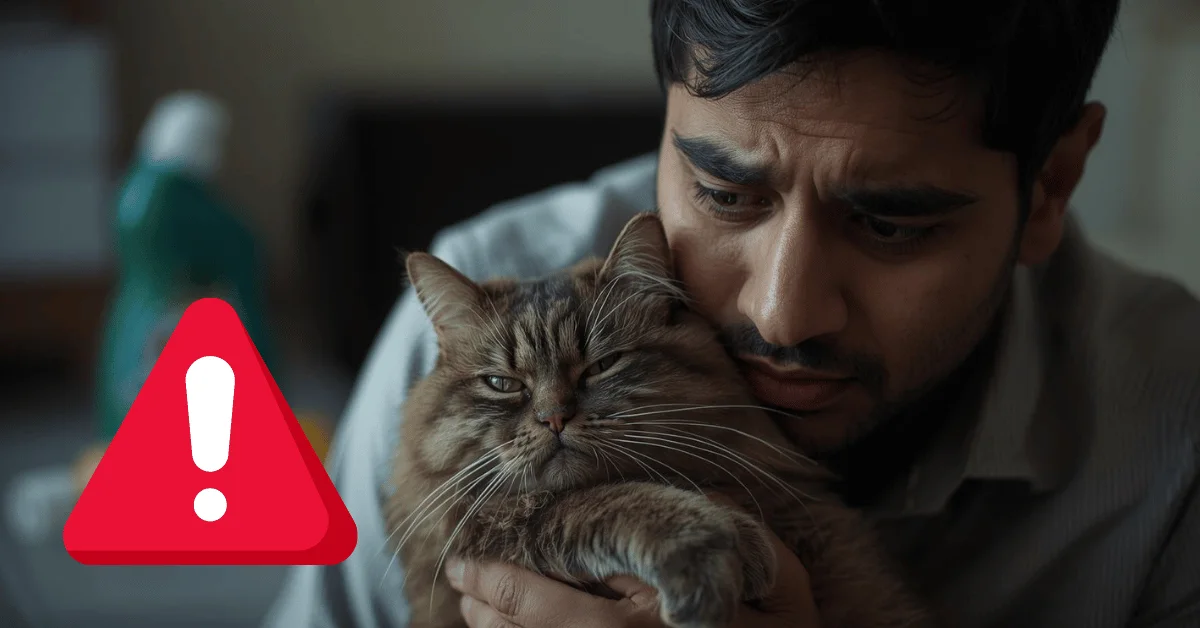Cats are naturally curious creatures, and while this makes them adventurous, it also puts them at risk of coming into contact with toxic substances. From household cleaners and medications to certain plants and foods, potential poisons are everywhere.
1. Sudden Vomiting and Diarrhea
Vomiting and diarrhea are among the most common and immediate signs of poisoning in cats. These symptoms occur because the body is trying to expel toxins quickly.
Why This Happens
When a cat ingests a harmful substance, their digestive system reacts defensively. Persistent or bloody vomit and diarrhea are especially concerning, as they may indicate ingestion of a strong toxin.
2. Excessive Drooling and Foaming at the Mouth
Excess salivation is another red flag that your cat may have encountered something toxic.
Typical Triggers
Household chemicals, poisonous plants like lilies, and even some human foods such as garlic or onions can trigger drooling. If foaming at the mouth occurs, it’s often a sign of chemical irritation or ingestion of a bitter-tasting poison.
3. Difficulty Breathing or Rapid Respiratory Changes
Poisoning can impact a cat’s respiratory system, causing labored breathing, wheezing, or unusually fast respiration.
What to Watch For
If your cat appears to be gasping, panting, or breathing irregularly, it may suggest exposure to inhaled toxins, such as smoke, pesticides, or fumes from cleaning agents.
Related Posts
- Why Your Cat Follows You Everywhere: 7 Reasons Explained
- Why Do Cats Meow at Night? 4 Fascinating Explanations
- Why Does My Cat Scratch the Furniture? 5 Fixable Reasons
- Why Do Cats Sleep So Much? The Science Behind Cat Naps
- Why Do Cats Cry Like Babies at Night? 6 Surprising Reasons
4. Seizures and Muscle Tremors
Neurological symptoms like seizures are among the most alarming signs of poisoning.
How Poisons Affect the Nervous System
Many toxins — including certain rodenticides, insecticides, and antifreeze — can disrupt nerve signaling. This results in muscle tremors, twitching, or full seizures. Immediate veterinary care is essential in such cases.
5. Lethargy and Weakness
Cats suffering from poisoning may suddenly appear extremely tired, weak, or uninterested in their surroundings.
Understanding the Underlying Cause
Poisons often interfere with energy metabolism or oxygen delivery in the body. As a result, cats may struggle to move, collapse, or retreat to hiding places.
6. Loss of Appetite and Refusal to Eat
A cat that suddenly refuses food could be suffering from toxin exposure.
When to Take Action
If your cat consistently avoids meals, especially if paired with other symptoms, poisoning may be a factor. Loss of appetite often signals nausea, abdominal pain, or internal organ damage.
7. Unusual Behavior and Disorientation
Poisoning doesn’t just affect the body — it can alter behavior too.
Behavioral Red Flags
Cats may appear restless, confused, overly aggressive, or stagger as though intoxicated. These neurological effects often point to exposure to neurotoxins or alcohol-based substances.
8. Changes in Urination or Kidney Issues
Certain poisons directly harm the kidneys and bladder, leading to visible changes in urination.
Signs to Notice
Excessive thirst, frequent urination, or complete lack of urination are major concerns. Substances like antifreeze are highly toxic to a cat’s kidneys and can be fatal without urgent treatment.
9. Pale, Blue, or Yellow Gums
Checking your cat’s gums can reveal a lot about their health in poisoning cases.
What Gum Color Tells You
- Pale gums may signal blood loss or anemia caused by toxins.
- Blue gums indicate a lack of oxygen, often linked to respiratory toxins.
- Yellow gums suggest liver damage, which can occur with certain plant or medication poisonings.
10. Collapse and Coma
In severe cases, poisoning leads to collapse or unresponsiveness.
A Veterinary Emergency
If your cat becomes unconscious or cannot stand, this indicates critical organ failure. Immediate transport to an emergency veterinary clinic is the only safe response.
What To Do If You Suspect Your Cat Has Been Poisoned
- Call your veterinarian or an emergency pet poison hotline immediately.
- Avoid inducing vomiting unless specifically instructed by a professional.
- Bring the suspected toxin’s packaging or a sample to the vet if possible.
For more detailed advice, the ASPCA Animal Poison Control Centre provides up-to-date guidance on common pet toxins and emergency care (ASPCA Poison Control).
Conclusion
Cats are masters at concealing discomfort, but poisoning is one condition that demands immediate attention. Recognizing the signs — from vomiting and drooling to seizures and behavioural changes — could save your cat’s life.
FAQs About Cat Poisoning
Can a poisoned cat recover?
Yes, if treated quickly. Recovery depends on the type of toxin and how fast you get veterinary help.
What are common cat poisons?
Antifreeze, rodenticides, human meds, cleaning products, and toxic plants like lilies.
Should I make my cat vomit?
No. Only do so if a vet instructs you, as it can make things worse.
Can indoor cats be poisoned?
Yes. Household cleaners, certain foods, and plants indoors can all be toxic.

